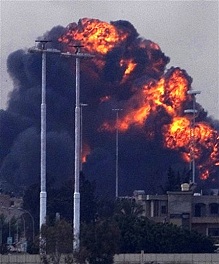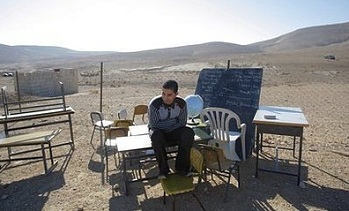Libyan War: Imperialism Pure And Simple
Kola Afolabi
Black Star News

US warplane crashes in Libya overnight.
Of all the struggles going on in North Africa and the Middle East right now, the most difficult to unravel is the one in Libya.
What is the character of the opposition to the Gadhafi regime, which reportedly now controls the eastern city of Benghazi? Is it just coincidence that the rebellion started in Benghazi, which is north of Libya’s richest oil fields as well as close to most of its oil and gas pipelines, refineries and its LNG port?
Is there a plan to partition the country? What is the risk of imperialist military intervention, which poses the gravest danger for the people of the entire region? Libya is not like Egypt. Its leader, Moammar al-Gadhafi, has not been an imperialist puppet like Hosni Mubarak.
For many years, Gadhafi was allied to countries and movements fighting imperialism. On taking power in 1969 through a military coup, overthrowing King Idris, he nationalized Libya’s oil and used much of that money to develop the Libyan economy. Conditions of life improved dramatically for the people. For that, the imperialists were determined to grind Libya down.
The U.S. actually launched air strikes on Tripoli and Benghazi in 1986 that killed 60 people, including Gadhafi’s infant daughter – which is rarely mentioned by the corporate media. Devastating sanctions were imposed by both the U.S. and the U.N. to wreck the Libyan economy.
After the U.S. invaded Iraq in 2003 and leveled much of Baghdad with a bombing campaign that the Pentagon exultantly called “shock and awe,” Gadhafi tried to ward off further threatened aggression on Libya by making big political and economic concessions to the imperialists. He opened the economy to foreign banks and corporations; he agreed to IMF demands for “structural adjustment,” privatizing many state-owned enterprises and cutting state subsidies on necessities like food and fuel. The Libyan people are suffering from the same high prices and unemployment that underlie the rebellions elsewhere and that flow from the worldwide capitalist economic crisis.

























